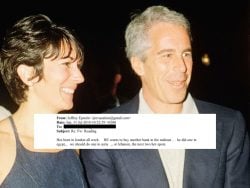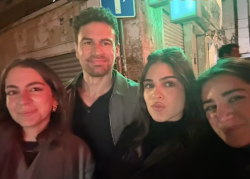Funk, Groove and Music from the Soul: The Herbaliser’s Ollie Teeba in Beirut
Ollie Teeba, born Oliver Lawrence Trattles, is a musical veteran and co-founder of the UK-based Hip Hop band, The Herbaliser. On July 19, he’s headlining what’s sure to be an amazing party at party at White Beach thanks to the Beirut Groove Collective. You could say his life is all about collecting records, chopping up samples, and racking up boxes of sneakers to add to his collection. Basically he’s living the dream. So we couldn’t wait to pick his brain about production, industry, longevity and sneakers. Take a look.

(Image via Flickr)
Beirut.com: You performed at DRM in Beirut back in 2011. How did it go, and did that experience influence your decision to come back to Beirut, especially considering the increasing instability of the country since the three years since you’ve been here?
Teeba: It was a really great show; very receptive audience. Having people who appreciate what we do is the most important factor, for me anyway. Had I not been to the city before, I would have no idea what to expect, so the previous successful visit has influenced [my decision to come back] yes.
Beirut.com: It looks like you’ve performed a bunch of times with DJ Format who was actually in Beirut at Yukunkun in May. Did he talk you into coming back to Beirut? Or did you even have a conversation about Beirut with him before you decided to book this event?
Teeba: He was instrumental in connecting me with Ernesto Chahoud, a co-organizer of the Beirut Groove Collective. Also Matt (Format) having had a good experience tells me that I will too, since we play a similar style of DJ sets. Generally, if he puts me in contact with someone and tells me that he had a good show with them, then I’m usually going to be playing for them too.
Beirut.com: Apart from being a vinyl collector, you also collect sneakers. When you tour around, I’m sure you like to go vinyl hunting, but do you also hunt for obscure sneakers to add to your collection?
Teeba: Whenever I see a sneaker store, I am basically powerless at resisting its lure. I don’t travel with the express intent of finding sneakers but sometimes they find me. I don’t really look for the obscure, just stuff I like. There are only a handful of models that I collect – but they seem to keep bringing out new colors that I just gotta have.
Beirut.com: You mentioned the notion of composing tracks in this electronic and synthesizer-filled era of music in past interviews and before the Herbaliser released their latest album, you said: “We’re coming back to this place we see as home and we don’t recognize it anymore because it’s been taken over by the machine.” Aren’t you worried that your purely organic sound, that is super reminiscent of early 2000’s Hip Hop beats, is just outdated, or you might be too early in bringing back this music when it comes to cyclical music trends?
Teeba: On the matter of music cycling trends, in the 90s people wanted to get away from the 80s and so a more 60s/70s sound became the influence. In the 2000s into the 2010s things started to sound more 80s again and the 70s sound of the 90s started to sound stale. As we move towards 2020 I think it will cycle again with the 80s influence passing out of fashion. You could also look at it like a cycle between synthetic vs organic. 70s = organic, 80s = synthetic, 90s/early 2000s = organic, late 2000s/early 2010s = synthetic. So, we are about due for a change. I do think the tide will turn. Especially since EDM is likely to burn out. We are already seeing evidence of this.
In any case, you have to make the music that is in your heart, otherwise it’s just not real. I basically see selling records and keeping with current styles as a short-term view. My personal desire is that after I’m gone and turned to dust, I have left something behind of value. Trends come and go. Just as I find records that are made sometimes many years before I was even born, I hope that a kid in the future can find the music that we have made and connect with it. Whether something was successful and considered to be relevant at the time it was made is of relatively minor importance. Many great works in any field were unappreciated at the time they were made but years later are regarded as very important historically.
Beirut.com: The Herbaliser has worked with rappers like Jean Grae, MF Doom, and Rakaa Iriscience of Dilated Peoples who are out of the Boom Bap era and very true to that sound. Your other group, Soundsci, is also very Boom Bap-ish. Do you think you would consider working with more “modern sounding” rappers and experimenting like Madlib and Freddie Gibbs on that “MadGibbs: Pinata” to create a different type of fusion of modern and retro Hip Hop?
Teeba: I’m basically not out to make retro records. I think there are many classic Boom Bap elements to Soundsci but if you play them next to a record from the 1990s they sound quite different. There’s a lot of people right now trying to re-create that classic sound and make records that sound like 1990-95. Not us. We are really about preserving the art of sampling because if we do not pass it along to the next generation it will become disconnected from Hip Hop completely.
Just as when Jake Wherry and myself started The Herbaliser we did not wish to be part of Acid Jazz which we saw very much as playing it retro. We wanted to bring the feeling while combining with more modern techniques. Plus, when it comes to MCs, I’m down for working with anyone I consider talented. There are many younger generation MCs that I think are dope as hell. In any case, we like to experiment in both projects, so nothing is out of the realms of possibility.
Beirut.com: Listening to your music and going through your interviews, it seems like you’re on a crusade against auto-tune. But pitch shift and time-stretch when it comes to production are essentially the basic functions of auto-tune, and you’ve used time-stretch and pitch shift a lot on the song “Generals” where Jean Grae’s voice was altered four times to create five different characters. Would you consider that to be a much different type of voice alteration than auto-tune?
Teeba: Yes. We weren’t trying to make an auto-tune sound. It is merely a tool. There’s nothing wrong with any tool, It’s just how you use it. In creativity, the end absolutely justifies the means. It’s the end result that’s important and not how it was made. At least the audience would tend to see it that way. They don’t care how it was made. I don’t subscribe to the opinion of: “it’s only authentic if it’s made in such and such a way, with such and such equipment”. My question always is, “But is it dope?” If the answer is “yes,” then it’s valid.
On the subject of auto-tune as an effect, I have nothing against any production technique per se. It’s just when it is used over and over again to create exactly the same sound. We are going through a bad time with the kind of music being released in the mainstream. Everything seems homogenized. Major record labels have always cashed in on trends, but more than ever the music out there, at least the stuff that is pushed by those with the power to promote it, sounds more and more indistinguishable.
Beirut.com: The Herbaliser still presses vinyls when it comes to their albums, and you encourage your fans to purchase and not download your albums so you can know whether you are in demand or not, but in this new age of music, do you feel that record sales are still a good measurement for demand?
Teeba: It’s very difficult to tell these days, isn’t it? We press vinyl because a significant portion of our audience demands it. We also believe in vinyl as a format. Its sound and its appearance are vastly superior to digi downloads which are not a tactile format. They are very impersonal. We do produce in that format, obviously. But personally I find it to be a bit non-existent. You don’t really own it. As Bruce Willis discovered when he tried to leave his daughters his digital music collection and iTunes said nooo.
Plus, as a DJ I am moving back to vinyl to some extent. You don’t got no braggin’ rights with digi. You can’t say “look what I got” ‘cos you don’t.





